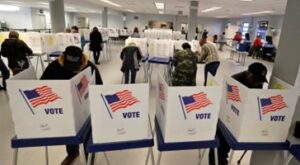The DFL trifecta passed a wide-ranging list of laws that take away citizens’ rights – most importantly, the right to vote on school referenda.
During the 2023 session, school boards were awarded the right to renew an existing school referenda one time.

After those referenda expires, voters would once again have the opportunity to weigh in on renewed spending.
In practical language, this could mean that one vote could raise taxes for the local school district for 10 years.
DFL leaders were quick to defend this usurping of voters’ rights by saying that school boards “can only do it once.”
Yes, that’s right: but they ultimately took away taxpayer’s right to vote.
You can read about the legislature giving school boards the ability to renew property tax levies without a vote below, or here.
—
School boards may now renew property tax levies under new Minnesota law
Those renewals, which used to go to voters, can only happen once.
By Eder Campuzano
Star Tribune
School boards in Minnesota may now renew property tax levies that pay for things like classroom materials and career and technical programs, a responsibility that until now rested with voters who elected those officials.
But they can only do it once.
That’s the upshot of a new law that went into effect late last month when Gov. Tim Walz signed the sweeping education bill that Minnesota lawmakers largely passed along party lines.
“This has been a membership-supported position for a number of years,” said Kirk Schneidawind, executive director of the Minnesota School Boards Association (MSBA).
School districts must still go to voters when they first seek a new property tax levy. But critics of the new law say it dilutes voters’ say in how their tax money is spent when levies come up for renewal. Osseo School Board Member Tanya Simons argues that referendums represent “important oversight for our constituents.”
“It gives them the power to tell us whether they agree with how we’re using taxpayer money,” she said.
Simons told her peers on the Osseo School Board she couldn’t support lobbying in favor of the law back in December. Now that it’s passed, Simons said she’d likely vote against a levy renewal if it came up for a vote in her district.
“It would be a little self-serving to say we know how the majority of our constituents would want us to vote,” she said.
The school board association has long pressed lawmakers to adopt such a provision in state law, citing historically overwhelming public support for property tax renewals.
Fourteen school districts asked voters to renew property tax levies in 2022, according to MSBA data. Only one of those efforts failed at the ballot — a 10-year, $173,000 measure to pay for career technical programs and classroom materials in the Staples-Motley district, located about an hour north of St. Cloud. The district enrolls 931 students.
More than a dozen districts have levies expiring next July, which means their school boards must hold a vote by Wednesday or approach voters with the question on the ballot later this year. Four of those districts — Lakeville, New Prague, Hastings and Eastern Carver County — are in the seven-county metro area.
All of those districts have scheduled board meetings to consider renewing their property tax levies.
Some lawmakers and school board members say the broad support for levy renewals makes the campaigns around them, with district staff spending hours compiling informational packets and presentations for public meetings, overly burdensome — taking time away from focusing on programs for students.
“That can all add up,” said Sen. Mary Kunesh, DFL-New Brighton, who chaired the Senate Education Finance Committee.
Supporters say the public feedback sessions required by the law provide communities with a mechanism to make their voices heard.
Hastings School Board Chair Lisa Hedin, who will preside over one of the state’s first levy renewal votes on Wednesday, said the new law provides districts with one more tool to secure funding.
Even if the agenda item for that meeting is for the board to consider its own renewal of the levy, members might still put the question to voters if they feel that’s the right thing to do.
“We stand ready as individual board members to take public feedback, then act based on the information we collect,” Hedin said.
There are other guardrails. Boards may renew a levy only for the same amount and length voters originally authorized.
Still, Republican lawmakers would have preferred the law not apply to existing levies, but only those new ones approved by voters going forward. That way, the voters could make their choice with the knowledge that school boards could renew the levy without a public vote later, Senate GOP spokeswoman Rachel Aplikowski said.
Simons, the Osseo board member, would rather lawmakers overhaul the school funding structure instead of tweaking the levy process.
“If the Legislature feels the model isn’t working in the state, it should enact a permanent change,” she said.




